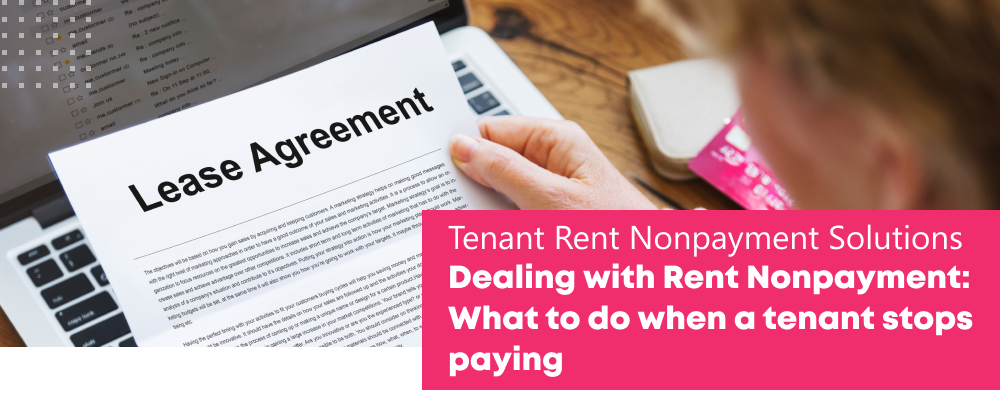Dealing with Rent Nonpayment: What to Do When a Tenant Stops Paying
As a property management company or landlord, dealing with rent nonpayment can be one of the most challenging aspects of managing rental properties. When a tenant stops paying rent, it can disrupt your cash flow, jeopardize your financial stability, and lead to difficult decisions. What to do if someone is dealing with rent nonpayment or what to do when a tenant stops paying. We’ll provide you with a comprehensive guide on what to do when faced with rent nonpayment, helping you navigate this stressful situation effectively.
1. Communicate Early and Clearly
The first step in addressing rent nonpayment is communication. If a tenant misses a rent payment, don’t jump to conclusions or take immediate legal action. Instead, reach out to the tenant promptly and with empathy. Sometimes, nonpayment may result from a genuine oversight or a temporary financial setback.
Initiate communication via phone, email, or in writing, reminding the tenant of their missed payment and inquiring about the reason. Keep the lines of communication open and be willing to listen to their side of the story. Maintaining a respectful and understanding tone can often lead to a resolution without resorting to legal action.
2. Understand Tenant Rights and Lease Agreement
Before taking any action, it’s crucial to familiarize yourself with the tenant’s rights and the terms of the lease agreement. The lease should outline the rent payment schedule, grace periods, late fees, and the consequences of nonpayment. Understanding both the legal and contractual aspects will help you determine the appropriate course of action.
3. Offer Payment Plans
What to do when a tenant stops paying? In cases where tenants are experiencing temporary financial difficulties, consider offering a payment plan. This can involve breaking the overdue rent into smaller, more manageable installments over an agreed-upon period. Document the terms of the payment plan in writing, including due dates and amounts.
4. Serve a Notice to Quit
If communication and negotiation fail to resolve the issue, and the tenant continues to miss rent payments, you may need to serve them with a Notice to Quit or Pay Rent. This is a legal document that formally informs the tenant of their rent arrears and provides a specified period to pay or vacate the property.
The timeframe and requirements for this notice vary by jurisdiction and lease agreement, so consult local laws and regulations or seek legal advice to ensure compliance. Sending this notice is typically the first step in the eviction process.
5. Eviction as a Last Resort
Eviction should always be the last resort. If the tenant fails to respond to the Notice to Quit or Pay Rent and continues nonpayment, you may need to proceed with eviction proceedings through the court system. This process can be time-consuming and costly, so it’s essential to weigh the pros and cons carefully.
6. Seek Legal Counsel
Navigating the legal aspects of rent nonpayment and eviction can be complex and fraught with potential pitfalls. It’s advisable to consult with an attorney who specializes in landlord-tenant law to ensure that you are following all applicable laws and regulations.
7. Minimize Vacancy
While dealing with rent nonpayment, property management companies should also take steps to minimize vacancy. Explore alternative options, such as finding a new tenant, if eviction seems inevitable. Keeping the property occupied will help mitigate financial losses.
8. Document Everything
Throughout the process of dealing with rent nonpayment, it’s crucial to maintain detailed records of all communication, notices, payment plans, and financial transactions. This documentation will be invaluable if legal action becomes necessary and can help protect your interests.
9. Learn from the Experience
After resolving the issue of rent nonpayment, take some time to reflect on the situation. Consider whether there are changes or improvements you can make to your leasing process, tenant screening, or communication to prevent similar situations in the future.
10. Partner with a Property Management Company
Property management companies, such as Optivo Group, can be invaluable partners in dealing with rent nonpayment. Their experience and expertise can help you navigate complex tenant issues while ensuring that your property remains a profitable investment.
In conclusion, dealing with rent nonpayment can be a challenging and stressful aspect of property management. However, by following these steps, communicating effectively, understanding the law and lease agreements, and seeking legal counsel when necessary, you can address the issue while protecting your interests. Remember that eviction should be a last resort, and maintaining open lines of communication is often the key to resolving rent nonpayment issues amicably.
